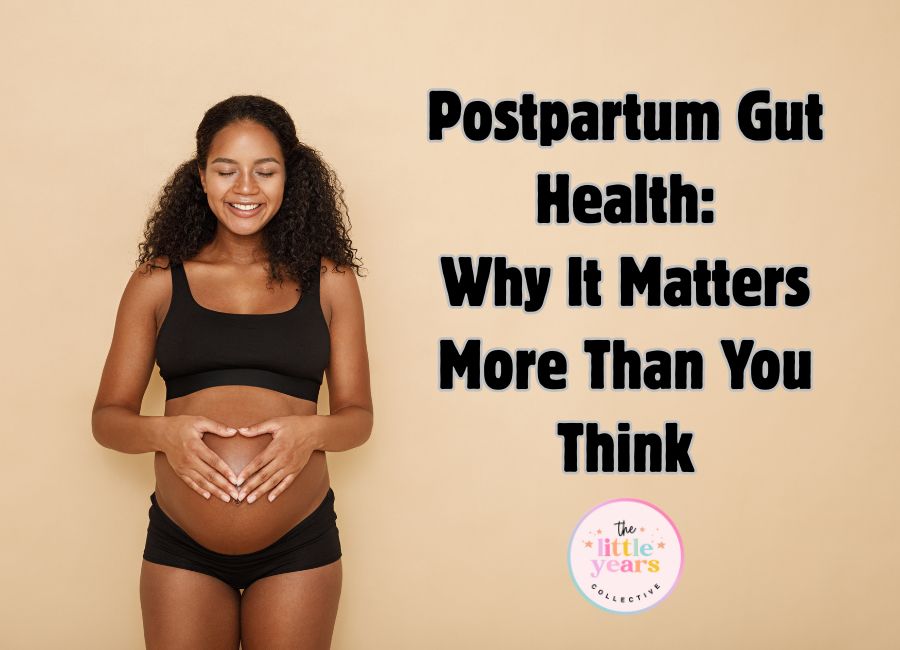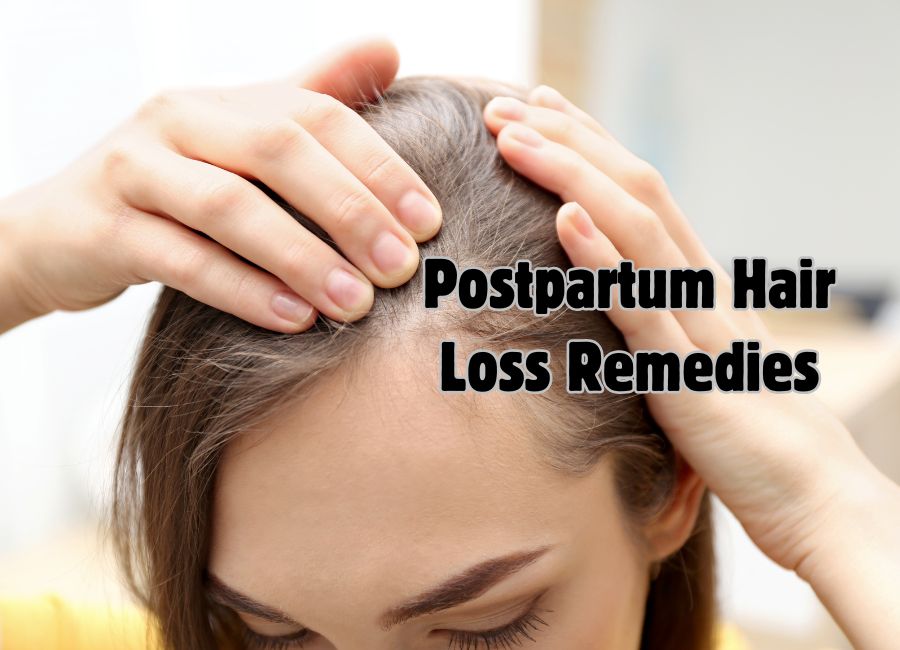Postpartum Gut Health: Why It Matters More Than You Think
This blog post is for educational purposes only. Always consult your healthcare provider when making decisions related to pregnancy, postpartum recovery or parenting. Some links may be affiliate links. That means I may make a commission if you use my links to purchase, at no extra added cost to you. I only recommend products that I personally love and believe in. Read our full privacy policy.

If you’re a new mom navigating the postpartum period with a mix of awe, exhaustion, and a million questions—you’re not alone. Amid sore breasts, sleepless nights, and feeding schedules, your gut health might not be the first thing on your radar. But it should be.
A healthy gut microbiome plays a crucial role in how you heal, feel, and function during the fourth trimester and beyond. In fact, supporting your digestive system might just be the missing piece to a smoother postpartum recovery.
Let’s dive into everything you need to know about postpartum gut health. We’ll talk about what happens to your gut during and after pregnancy, how it connects to your mood and energy levels, and what simple steps you can take to support a healthy gut and feel like yourself again.
What Is Gut Health and Why Does It Matter Postpartum?
Your gut is more than just your stomach—it’s a complex system made up of your digestive organs, GI tract, and trillions of bacteria (some good, some not-so-good) that live in your digestive tract. These bacteria—called the gut microbiota—form a diverse community of bacteria that affects everything from nutrient absorption, immune response, and hormonal changes to your mental health, mood, and even cognitive function.
During pregnancy, your body goes through enormous physiological changes, and your gut is no exception. From gestational diabetes to vaginal delivery, these events shape your microbiome in significant ways. After birth, especially in the postpartum phase, your body is doing the hard work of healing. That’s why prioritizing digestive health isn’t just a good idea—it’s essential.
The Gut-Brain Axis: Connecting Your Belly to Your Brain
Ever heard the phrase “gut feeling”? It’s more than just a saying. The gut-brain axis is the communication superhighway between your nervous system and your digestive system. Numerous studies have found that gut bacteria can influence mood swings, anxiety, and even postpartum depression.
A recent study published in 2022 explored how imbalances in the gut microbiome may be one of the lesser-known risk factors for developing PPD (postpartum depression). Supporting a healthy gut microbiome could have potential benefits for your mood and emotional well-being during this vulnerable time.
Microbiota Composition During and After Pregnancy
When you’re pregnant, your gut microbiome changes significantly. It becomes more inflammatory to support nutrient absorption and energy storage for the growing baby. These significant changes often persist after birth, making the first step to healing your gut an important one.
There are also significant differences between women who had a vaginal birth versus those who had a cesarean section. A vaginal delivery exposes your baby to your vaginal microbiome, which is crucial for your baby’s immune system and early gut microbiota development. With a cesarean section, this exposure doesn’t happen, which may impact your new baby and your own recovery differently.
How Hormones, Stress, and Sleep Affect Gut Health
The postpartum period brings a rollercoaster of hormonal changes, which can directly affect your digestive tract and gut flora. Add in the stress response from sleep deprivation and the new responsibilities of motherhood, and your microbiome can easily become unbalanced.
Environmental factors like your diet, stress levels, sleep habits, and even lack of social support all contribute to your gut health. This is why lifestyle changes—even small ones—can make a big difference in restoring balance and promoting healing.
Common Digestive Issues in the Postpartum Phase
Some new mothers experience a range of digestive issues in the early weeks, including:
- Abdominal pain
- Fecal incontinence
- Irregular or painful bowel movements
- Gas and bloating
- Constipation or diarrhea
These issues can be uncomfortable and even distressing, especially when paired with sore breasts or pelvic floor issues. Don’t ignore them—supporting your gut can help minimize these symptoms and promote regular bowel movements and comfort.
Key Factors That Support Postpartum Gut Health
Let’s get into the good stuff. Here are key factors that help support a balanced gut microbiome and aid in postpartum recovery:
1. Balanced Diet
Eating a healthy diet rich in whole grains, dairy products, leafy greens, lean proteins, and fermented foods supports a diverse community of bacteria in your gut. An anti-inflammatory diet also helps lower stress in the gi tract and support the healing process.
2. Probiotic Supplements
Quality probiotic supplements can help increase the presence of beneficial bacteria, reduce bad bacteria like e. coli, and restore microbiome balance. Always talk with your healthcare provider before starting new supplements, especially if you’re breastfeeding.
3. Physical Activity
Gentle physical activity like walking, stretching, or pelvic floor exercises not only supports healing but can stimulate the movement of food through your system, helping ease constipation and discomfort.
4. Pelvic Physical Therapy
Working with a physical therapist who specializes in postpartum care (especially for pelvic physical therapy) can address lingering digestive issues and help restore function and comfort in your core and pelvic areas.
5. Hydration & Fiber
Staying hydrated and getting plenty of fiber helps support digestive health, keeps things moving, and nourishes your gut flora.
6. Sleep and Stress Management
Easier said than done, right? But managing your stress response and getting even short stretches of rest supports both your nervous system and immune function, helping your gut and your mood.
The Role of Gut Health in Breastfeeding
A healthy gut doesn’t just help you—it can support your milk production and even affect the quality of your breast milk. Some previous studies suggest that gut microbes can influence the levels of amino acids, fatty acids, and antibodies in breast milk, which may impact your baby’s health and baby’s immune system in the first year.
Understanding Your Microbiome at the Genus and Phylum Level
Science geek moment! Your gut bacteria are classified on a phylum level (the broader category) and genus level (more specific). Changes at these levels during the postpartum period may explain why some women bounce back faster, while others experience more intense fatigue, digestive distress, or postpartum depression.
Systematic reviews are still exploring how these changes affect maternal health, but one thing is clear: your gut plays a pivotal role in your postpartum experience.
When to Seek Help
If you’re experiencing severe digestive issues, abdominal pain, or signs of postpartum depression, talk to your healthcare provider. If you’re dealing with fecal incontinence, sore pelvic muscles, or just not feeling like yourself, a pelvic physical therapy referral may be a helpful next step.
Remember: there’s no badge of honor for suffering in silence. Support is a key role of postpartum care, and asking for help is a strong and important move.
Final Thoughts: Your Gut Deserves Love Too
Healing after birth is no small feat, and taking care of your digestive system might just be the secret weapon for a better postpartum recovery. A balanced gut microbiome supports your energy, mood, hormones, digestion, and even your connection to your new baby.
So go ahead—add some sauerkraut to your plate, take that probiotic, and prioritize rest. Your gut (and your whole body) will thank you.
You might also enjoy these articles:
Can You Get a Brazilian Wax While Pregnant?
P.S. Want more evidence-based support for the fourth trimester? Be sure to check out our full course, The Fourth Trimester Toolkit, right here at The Little Years Collective.
Because you deserve to feel empowered, calm, connected—and yes, happy—in new motherhood.


